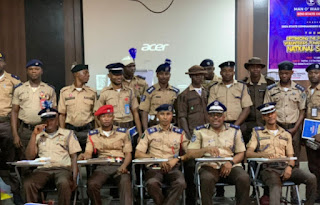Curbing environmental pollution: Group calls on Edo State government to prohibit open burning of waste
The Sustainable Environment Development Initiative (SEDI), has called on Edo State government to prohibit the open burning of household, industrial, and biohazard wastes in order to avert harmful pollution which poses as risk to human health in the State. According to SEDI, Burning of trash releases dioxin, lead, and mercury.
This call was made by the Executive Director of SEDI- Dr. Tom Aneni, in a one-day workshop on Pathway to Municipal Waste Management in Edo State, organised by SEDI in Benin City. Dr. Aneni said managing solid waste has become an important concern in both domestic and international material cycles, for environmental preservation, efficient resource utilization and sustainable development.
"Open and indiscriminate burning of hazardous and non-hazardous solid waste as a disposal method, is still a common practice among the citizenry. This workshop is in line with the Federal Government Gazette No. 5, Vol. 98 on the 5R’s of waste management, namely: Reduce, Repair, Re-use, Recycle and Recover.
"Municipal Solid Waste (MSW) as defined by the UN-Habitat are wastes generated by households, and wastes of a similar nature generated by commercial and industrial premises, by institutions such as schools, hospitals, care homes and prisons, and from public spaces such as streets, markets, slaughter houses, public toilets, bus stops, parks, and gardens. This working definition also includes most commercial and business wastes, with the exception of wastes from industrial processes and other hazardous wastes.
"Majority of these substances are composed of paper, organic matter, plastics, metals, textiles, rubber and glass. Primarily, plastics, glass and most metals that make up fractions of these wastes are non-biodegradable and thus remain a nuisance in the environment for years.
If left unchecked solid waste can lead to grave environmental and health consequences; however, if properly managed solid waste can be harnessed to create job opportunities and promote growth in Gross Domestic Product (GDP) through wealth generation mechanisms, in addition to a host of environmental, social and aesthetic benefits that will be created.
"It is necessary for Nigeria to tackle the issue of solid waste with all seriousness and to align with international best practices and thus adopt solid waste management trends that will: Promote job creation and improved economic activities by establishing waste to wealth schemes and Comply with international best practices in environmental health and safety standards for SWM sector.
"Waste management entails a holistic approach, which spans from reduction, sorting, reuse, collection, storage, transport, recovery, recycling, treatment and disposal in an environmentally sound manner. Designing and implementing proper solid waste management techniques aid in creating employment through the different chains including waste pickers involved in sustainable and sound management practices.
"A properly managed SWM programme with the “best environmental practices” in place and utilizing the “best available technology” options will integrate and improve the capacity and techniques for waste collection and management of an already existing informal sector (waste pickers), develop a platform to embed them and create new employment opportunities.
"There is need for profit-making opportunities in waste management schemes so as to facilitate private sector participation with a view to generating employment opportunities, and thus act as a poverty reduction tool. There is need to ensure occupational health and safety measures are always adhered to for waste pickers.
"I hereby call on all stakeholders (communities, CBOs, NGOs, Policy makers, Solid waste management agencies, industry, waste pickers, media etc.), should be consulted and involved in the sustainable management of solid waste. Media sensitization of the public is needed on the need for sustainable solid waste management practices", said the SEDI boss.
Speaking, a representative of the Permanent Secretary, Edo State Ministry of Environment- Igho Igbinosa, Esq., commended SEDI for organizing the programme. Mr Igbinosa said the workshop was timely and apt in moving waste management practices in Edo State forward. He said apart from the environmental impact of waste in the society, waste generates job and create value chain opportunities.
On her part, Assistant General Manager (Compliance), Edo State Waste Management Board- Mrs. Efosà Imade A.B., while speaking on Waste Management: Best Practices for Non-Incineration Alternatives, said waste management involved the processes and actions required to manage from from inception to its final disposal. This according to her, include the collection, transportation, treatment, and disposal of waste together with monitoring and regulation of waste management process.
According to her, "Edo Waste Management Board (EWMB) is charged with the responsibility of managing waste in Edo State".
Representatives of waste pickers at the workshop gave their challenges to include: bad roads that lead to dumpsites, thereby making it inaccessible to vehicles; poor safety equipment; and insecurity at the dumpsites.
There was a presentation of the draft constitution of Edo Waste Pickers Association, presented by their leader, Mr. Oloye Osabuohien.





Comments